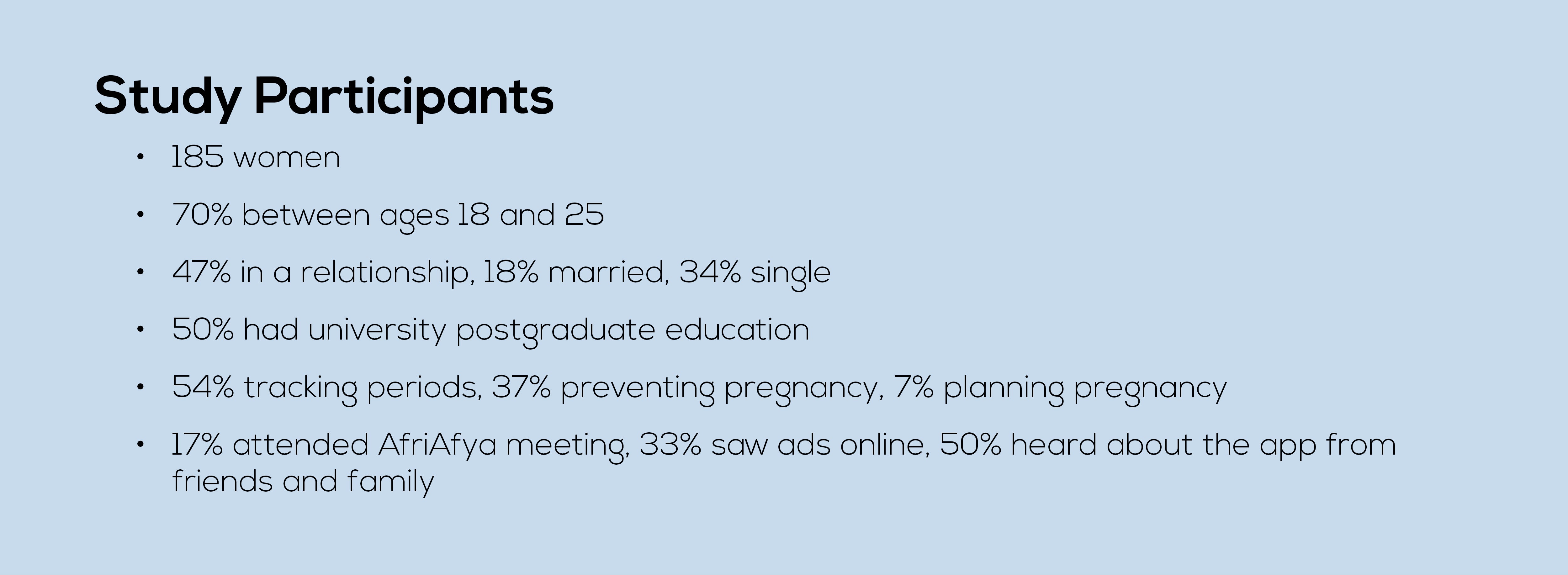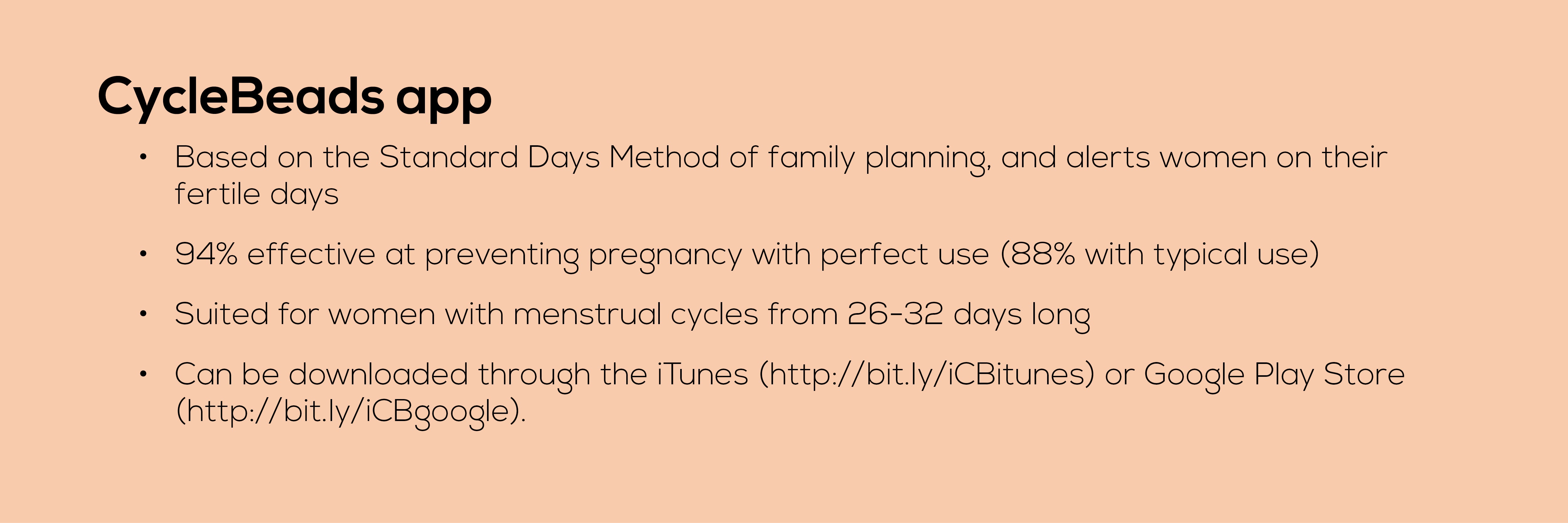Results: CycleBeads App in Kenya
STUDY DESCRIPTION
Georgetown University’s Institute for Reproductive Health and iHub Research conducted a study in Nairobi, Kenya from May to September 2015 to learn about use of the CycleBeads® app. The CycleBeads app is developed and managed by Cycle Technologies, which also supported this work by managing the digital communications and marketing.
Researchers talked to women using the CycleBeads app up to three times over three months to learn about who uses the app and find the best way to reach others who might be interested in using it. Women heard about the app online (Facebook, Twitter), at NGO community-based meetings hosted by Afri-Afya or through family and friends. We called these our three distribution channels. We wanted to see if there were differences in number of downloads and correct use of the CycleBeads app by distribution channel.
Note: These findings are only about the women who were interviewed as part of this study, not about everyone who downloaded the CycleBeads app.
STUDY FINDINGS
1. Distribution channels
- AfriAfya held five meetings in Nairobi, two of them in large central locations and three in local neighborhoods. They taught people about reproductive health, family planning, and the CycleBeads app. Over 300 women and men went to those meetings.
- Cycle Technologies advertised over social media and Facebook. 2,115 people in Kenya downloaded the app from Facebook advertising.
- Different distribution channels reached different people. For example, women who heard about the app through friends or family were younger, less educated, and used the app to track their cycles. Women who heard about the app on Facebook were more likely to be planning a pregnancy.
2. Purpose of use
- Most women used the CycleBeads app to track their periods (54%), or prevent pregnancy (37%). Only a few women used the app to plan pregnancy (7%).
- Purpose of use varied by distribution channel. Most women who heard about the app from an AfriAfya meeting were preventing pregnancy (58%). Most women who heard about the app through family and friends were tracking their menstrual cycle (70%). Women who downloaded through Facebook ads were split between preventing pregnancy (47%) and tracking their menstrual cycle (43%).
- 29 study participants switched their purpose of use during the study, most during the first six weeks of app use.
3. Knowledge of how to use the CycleBeads app
- Women understood the CycleBeads app and how to use it to prevent pregnancy. Knowledge improved over time. Within two weeks of downloading the app, 88% of women knew that days represented by white beads or days 8-19 of the menstrual cycle are fertile or unsafe days. After six weeks of use, everyone knew this.
- After six weeks of use, all of the women using the CycleBeads app to prevent pregnancy understood the message about the first day of the fertile window. Most also knew how to tell if a woman’s cycle is too short to use this method (97%) and that pregnancy was not likely on brown bead days (90%).
4. Correct use of the CycleBeads app to prevent pregnancy
- Within two weeks of downloading the CycleBeads app, 93% of participants using the app to prevent pregnancy had entered a period start date.
- After three months of use, most participants (93%) said that they avoided unprotected sex on fertile days. However, some participants (20%) thought that withdrawal was a valid method on fertile days for preventing pregnancy. While withdrawal is better than nothing, it is not as effective as condoms or abstinence. This needs to be made clear to women using the app for pregnancy prevention.
- Participants who had more correct knowledge of the app were NOT more likely to use it correctly. Study participants had high levels of knowledge and understood how the CycleBeads app worked. Choosing not using condoms or abstaining on fertile days was not a result of lack of knowledge about the CycleBeads app and how to use it to prevent pregnancy.
5. Previous use of family planning
- Of the women who used the CycleBeads app to prevent pregnancy, almost half (42%) had never used a family planning method before, 42% had used a short-acting modern method (male condoms, female condoms, pill, CycleBeads, emergency contraception ), 12% had used long-acting reversible contraception (injection, IUD, implant), and 4% had relied on a traditional method (withdrawal, rhythm method).
- Male condoms were the most common method of family planning used before the CycleBeads app (60%).
- The top reasons for choosing the app to prevent pregnancy were fear of side effects from other methods, belief that the app is simple or easy to use, desire to get pregnant within the next year, belief that the app is effective, the app is free, or wanting to try something new.
6. Involvement of partner
- About half of the women who had a partner said their partner knew that they were using the CycleBeads app within two weeks of use (52%). By three months, most women with a partner had talked to them (77%).
- Women older than 25 years old, and women with more education were more likely to say their partner knew about the CycleBeads app.
- Most women said that their partners were in favor of the CycleBeads app
7. Reasons for discontinuation
- Of the women who stopped using the CycleBeads app entirely, most said they thought they would use the app in the future (62%), and had recommended the app to someone else (72%).
- The top reasons for stopping use of CycleBeads app to prevent pregnancy were wanting to become pregnant, having cycles that were too long or short or irregular, or losing/replacing a phone. Of the women who stopped using the CycleBeads app to prevent pregnancy, and still wanted to prevent pregnancy, only a few reported using another family planning method or planning to use another method (26%).
CONCLUSIONS
These findings suggest that the CycleBeads app is useful for Nairobi women. The app was clearly understood, and for the most part, recommended by the women in the study.
Based on these results, the CycleBeads app will continue to be promoted throughout Kenya and other countries as a family planning option. IRH will also publish papers on these results.
For more information or questions, please email irhinfo@georgetown.edu
 Where We Work
Where We Work  Press Room
Press Room  FACT Project
FACT Project  Passages Project
Passages Project  Learning Collaborative
Learning Collaborative  Search All Resources
Search All Resources  Social Norms
Social Norms  Fertility Awareness Methods
Fertility Awareness Methods 
